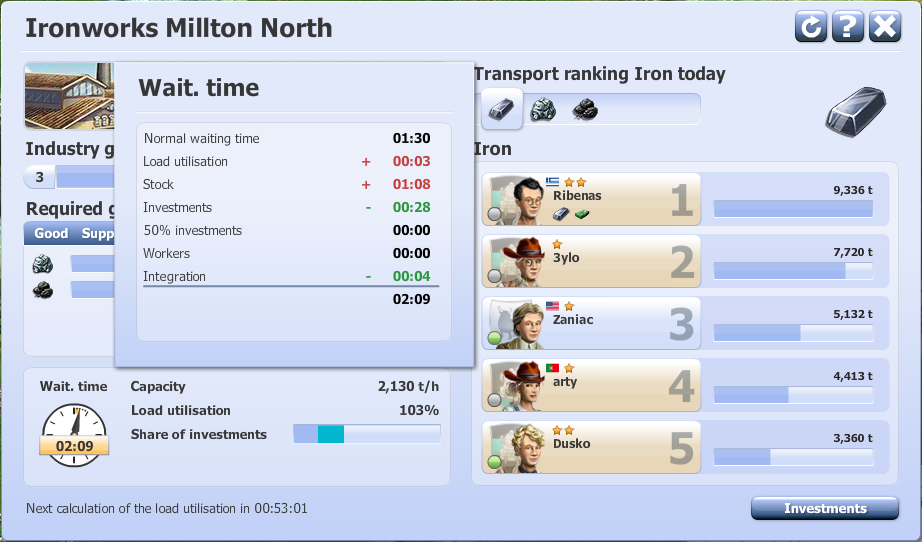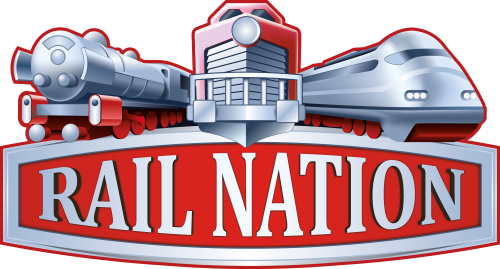Tags: Visual edit apiedit |
No edit summary |
||
| Line 74: | Line 74: | ||
Integration involves supplying goods to - and hauling from - a particular industry. More supplies delivered results in larger wait time bonuses for all players from your association. Industries have a base price they pay per ton for supply deliveries. Integration will provide additional bonuses, depending on how much of each supply your association is delivering to the affected industry. It is possible for an industry to be adequately supplied while still having a small integration time bonus. This occurs if most of the supplies being delivered are by members of other associations. |
Integration involves supplying goods to - and hauling from - a particular industry. More supplies delivered results in larger wait time bonuses for all players from your association. Industries have a base price they pay per ton for supply deliveries. Integration will provide additional bonuses, depending on how much of each supply your association is delivering to the affected industry. It is possible for an industry to be adequately supplied while still having a small integration time bonus. This occurs if most of the supplies being delivered are by members of other associations. |
||
==Route Types== |
==Route Types== |
||
| − | |||
{{stub}}There are three ways you can use an industry for the benefit of your city. |
{{stub}}There are three ways you can use an industry for the benefit of your city. |
||
| − | #Required Good (RG)-->City (aka Direct Haul Route - no supplies delivered to RG industry) |
+ | #Required Good (RG)-->City (aka Direct Haul Route - no supplies delivered to RG industry). For example, hauling flour to the city. |
| − | #Supply Good-->RG-->City (aka Integrated Route or Double-Haul Route) |
+ | #Supply Good-->RG-->City (aka Integrated Route or Double-Haul Route). For example, hauling wheat to the flour facility and then flour to the city. |
| − | #Supply Good-->RG (aka Supply ONLY - Supply delivered to RG industry, but RG is NOT delivered to the city) |
+ | #Supply Good-->RG (aka Supply ONLY - Supply delivered to RG industry, but RG is NOT delivered to the city). For example, hauling wheat to the flour facility. |
Latest revision as of 16:07, 8 July 2019
Industries are the factories where you can pick up goods to deliver elsewhere. Goods can be delivered to either a city or to another industry. Industries can be divided into raw material producers and processing plants.
Waiting Time
The waiting time at an industry depends on different factors:
- Increases wait times
- Load Utilization (aka Occupancy)
- Stock (how well the required supplies for the industry are already on-hand, the greater the amounts of stock, the lesser the negative effect upon the industry)
- Strike (when an industries workers go on strike wait times will double)
- Decreases wait times
- Investments (money invested by you personally)
- 50% Investments (decreases wait time by 50% if your association has at least 50% of all investments in that industry)
- Workers (purchased by your association)
- Integration (decreases wait time, based on the Supply goods delivered to the industry by your specific association).

Wait Time Overview
To see what factors are affecting wait time and to what extent, click on any industry to open the Industry Overview window. Next, simply mouse over the clock on the bottom left corner of the window. You can also see how Investments will affect wait time before and after making another investmnet by clicking on the Investments button at the bottom right of the Industry Overview window, as seen above.
Load Utilisation
Wait time will increase with higher utilisation level. Utilisation level can be anywhere between 0-300%. In the sample picture above, 2130 tons/hour would be equivalent to 100% utilisation. This converts to an average of 35.5 tons/minute. Although higher utilisation levels do result in higher wait times, higher demand also causes the industry to "level up", or increase its hourly capacity more quickly. With a consistent 300% occupancy rate, it will take an industry four hours to level up. With sufficient investments AND 300% occupancy, leveling up can be achieved in as little as three hours.
Stock
Stock (aka Supply Level) increases wait time, depending on how well each required supply is stocked at the industry. It is essential for you and other players in your city to keep the affected industry adequately supplied as a well-stocked industry will give a much smaller wait time penalty. The penalty is counting for the worst (least stocked) goods.
Investments
A player can make investments in an industry to reduce the waiting time when picking up goods. If an association has made more than 50% of the investments, the waiting time for members of that association will be reduced by 50% as long as the association's investment remains above 50%. When an industry levels up, players who have made investments receive prestige points.
Workers
Workers can be purchased by each association. Workers provide a variety of benefits to all members of the association, but you and your association should focus specifically on workers who give wait time bonuses if you want to help expedite city growth.
Integration
Integration involves supplying goods to - and hauling from - a particular industry. More supplies delivered results in larger wait time bonuses for all players from your association. Industries have a base price they pay per ton for supply deliveries. Integration will provide additional bonuses, depending on how much of each supply your association is delivering to the affected industry. It is possible for an industry to be adequately supplied while still having a small integration time bonus. This occurs if most of the supplies being delivered are by members of other associations.
Route Types
- There are three ways you can use an industry for the benefit of your city.
- Required Good (RG)-->City (aka Direct Haul Route - no supplies delivered to RG industry). For example, hauling flour to the city.
- Supply Good-->RG-->City (aka Integrated Route or Double-Haul Route). For example, hauling wheat to the flour facility and then flour to the city.
- Supply Good-->RG (aka Supply ONLY - Supply delivered to RG industry, but RG is NOT delivered to the city). For example, hauling wheat to the flour facility.
It is common for many players to put every train possible on Option 2 above (Integrated Route). In some cases, this may be the most profitable way to supply AND deliver RGs to the city. However, the further out of the way the Supply industry is from the RG-->City Direct route, the less likely it will be for Option 2 above to be the most profitable route, let alone beneficial to city growth. Also, putting everything possible on this type of route normally always prevents the city from growing at the most optimal rate. Therefore, it is often more profitable to put some trains on Option 1 and others on Option 3.
A general strategy that can be used is to combine options 1 and 3 above. This can help increase profits AND help the city grow more quickly. The proportion of trains on RG Direct routes vs. those on Supply ONLY routes can vary based on Stock levels and Load Utilisation, but a simple way to manage this is to divide your fleet by the number of goods involved. In other words:
- If the industry requires only one supply, try putting half your fleet on RG Direct route and the other half on Supply ONLY route.
- If the industry requires two supplies, put 2/3 of your fleet on RG Direct route and divide the other 1/3 of your fleet between each of the two Supply ONLY route options
It may seem like taking trains off of RG Direct or Integrated Routes will slow city growth. However, a single person taking every train they have off of RG direct route and onto Supply ONLY route can actually lead to more tons delivered to the city overall, over the course of an hour. This is because wait times can often decrease by 00:30+ for ALL players just because of the single player taking demand off of the RG and instead focusing heavily on supplying it. The wait time bonus for all will often overcome the decreased demand that results from a single player moving trains off of that good.
